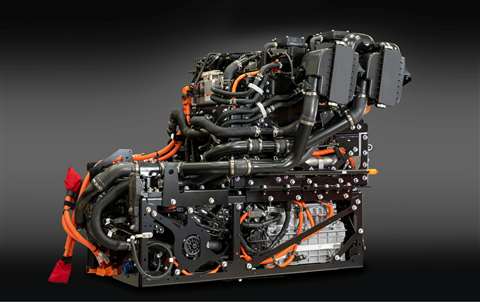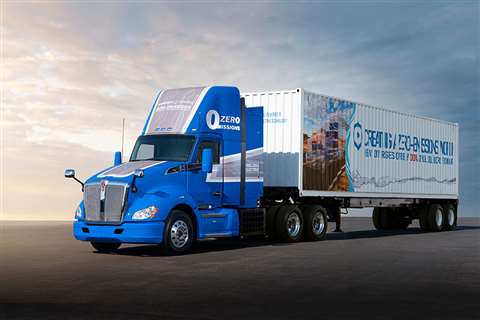CARB OKs Toyota’s heavy-duty fuel cell kit
24 April 2023
Toyota has announced it was recently granted a Zero Emission Powertrain (ZEP) Executive Order from the California Air Resources Board (CARB) for its new heavy-duty fuel cell electric powertrain.
 Toyota’s heavy-duty fuel cell electric powertrain kit has been designated a Zero Emission Powertrain by the California Air Resources Board (CARB). (Photo: Toyota)
Toyota’s heavy-duty fuel cell electric powertrain kit has been designated a Zero Emission Powertrain by the California Air Resources Board (CARB). (Photo: Toyota)
The company’s hydrogen-fueled powertrain kit includes hydrogen fuel storage tanks, fuel cell stacks, batteries, electric motors and transmission. Toyota said it offers a viable alternative to traditional diesel powertrains used in commercial goods transportation as companies look to transition their fleets to zero-emission vehicles.
CARB’s ZEP Executive Order certifies that the powertrain complies with CARB regulations for zero-emission powertrains determined to meet specific emissions standards required for sale in California. OEMs using Toyota’s certified powertrain may also be eligible for other available incentives, such as CARB’s Hybrid and Zero-Emission Truck and Bus Voucher Incentive Project (HVIP), the Clean Truck Fund (CTF) introduced last year by the ports of Los Angeles and Long Beach, along with certain federal incentives.
“Toyota aims to reduce or eliminate emissions for all mobility solutions, and our fuel cell electric powertrains have proven that hydrogen can play a significant role in the emissions reduction of emissions from heavy-duty transportation,” said Scott Friedman, senior program manager advanced mobility, Toyota Motor North America. “Receiving the Zero-Emission Powertrain Executive Order from CARB is a key achievement for our teams who have dedicated an incredible amount of time and effort, and we are excited to offer this powertrain commercially in the near future.”
Nearly 30 years in fuel cell development
Toyota has been investigating hydrogen fuel cell technology for nearly 30 years and debut a fuel cell automobile, the Mirai, in 2014. Since then, the company sold more than 21,000 vehicles globally, with most in California. The company is now looking to scale the technology now to other applications, including heavy-duty transport and power generation systems.
Toyota’s development of hydrogen-powered heavy-duty truck powertrains started with Project Portal in 2017. The company has developed multiple generations of powertrain prototypes, including those used in the Alpha and Beta trucks that logged nearly 14,000 miles of testing and real-world drayage operations in and around the port of Los Angeles.
It was the generation of truck named “Ocean” that showed some of the greatest examples of how hydrogen-based powertrains with fuel cell stacks could be used in real-world applications such as drayage, through a proof-of-concept demonstration at the port of Los Angeles as part of the Zero-and-Near-Zero Emission Freight Facilities’ “Shore to Store” Project (ZANZEFF). For the project, Toyota worked with Kenworth to develop trucks using an updated prototype fuel cell electric powertrain and deployed 10 Kenworth T680 Class 8 trucks.
 For Project (ZANZEFF) at the ports of Los Angeles and Long Beach, Toyota worked with Kenworth to deploy 10 Kenworth T680 Class 8 trucks powered by fuel cells. (Photo: Toyota)
For Project (ZANZEFF) at the ports of Los Angeles and Long Beach, Toyota worked with Kenworth to deploy 10 Kenworth T680 Class 8 trucks powered by fuel cells. (Photo: Toyota)
The T680 FCEV offered a range of about 300 miles when fully loaded to 82,000 lb. (GCWR), and with no downtime between shifts for charging and the short 15- to 20-minute fill time, the FCEVs could run multiple shifts a day and cover up to 400 to 500 miles. The 10 trucks served real-world customers via drayage routes, with infrastructure support from Shell, hauling cargo between the ports of Los Angeles and Long Beach and the LA Basin.
Toyota’s CARB ZEP-certified powertrain kit is now ready for commercialization, with production slated to start for customers later this year at the company’s Kentucky manufacturing plant.
“We believe hydrogen will play a significant role in the emissions reduction of heavy-duty transport while not sacrificing the distance, power, or fueling times needed to keep these fleet and individual operators running,” said Chris Rovik, executive program manager, advanced mobility, Toyota Motor North America. “Fuel cell technology is scalable, and we believe it will take an increasingly visible and important role in our collective fight to reduce and eliminate carbon as we move towards a hydrogen society.”
STAY CONNECTED




Receive the information you need when you need it through our world-leading magazines, newsletters and daily briefings.
POWER SOURCING GUIDE
The trusted reference and buyer’s guide for 83 years
The original “desktop search engine,” guiding nearly 10,000 users in more than 90 countries it is the primary reference for specifications and details on all the components that go into engine systems.
Visit Now
CONNECT WITH THE TEAM









